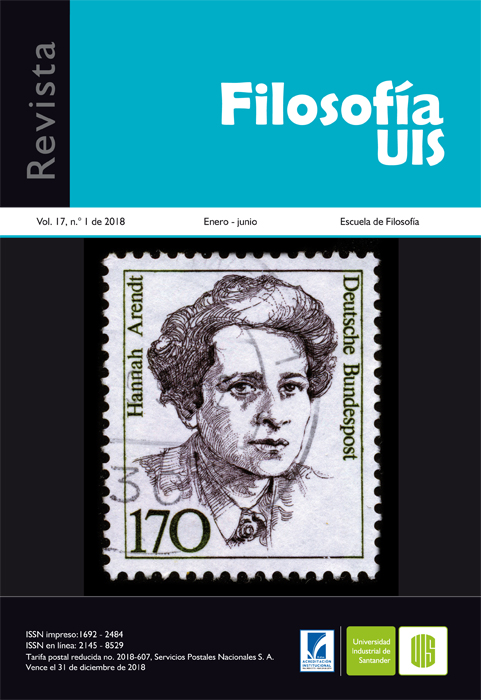Where are we when we are in the world? How to think the human space after the end of metaphysics
Published 2018-05-15
Keywords
- Heidegger,
- space,
- world,
- metaphysics,
- humanism
How to Cite
Copyright (c) 2018 Revista Filosofía UIS

This work is licensed under a Creative Commons Attribution 4.0 International License.
Abstract
The most remarkable feature of technological and intellectual history is that the culture that proceeds from it is producing a new state of aggregation of language and writing. This state cannot be translated with traditional interpretations by religion, metaphysics and humanism. The dependence between the metaphysics’s concept and the humanism´s concept, installs us in another space, or in a space without world. If language is the medium in which thought and world can appear and through its mediation the world manifests itself, the question that assails us after the end of humanism is what world do we inhabit? Where are we located when we are in the world? The turning after the end of metaphysics, that is, the displacement after the end of humanism always leads to a progressive series of decentralizations, always hunting for referents from other worlds and other spaces.
Downloads
References
Flamarique, L. (2010). Cultura post-filosófica y oportunidad de la metafísica. Diagnóstico y balance. Thémata. Revista de Filosofía, (43), 293.
Gabriel, M. (2015). Por qué el mundo no existe. Barcelona: Pasado y Presente.
Gabriel, M. (Abril de 2017). Conferencia realizada en el Palau Macaya de l’Obra Social “la Caixa”. Garcés, M. (2015). Filosofía inacabada. Barcelona: Galaxia Gutenberg.
Garcés, M. (2016). Fuera de Clase. Textos de filosofía de guerrilla. Barcelona: Galaxia Gutenberg.
Foucault, M. (5 de octubre de 1984). De los espacios otros. Recuperado de: http://yoochel.org/wp-content/uploads/2011/03/foucalt_de-los-espacios-otros.pdf . Consultado el 12 de abril de 2017.
Fernández, S. (1997). Heidegger y la Ética. Crítica a la Metafísica y Nacional-Socialismo. Cinta moebio (1), 18-26.
Habermas, J. (1999). El discurso filosófico de la modernidad. Madrid: Taurus.
Heidegger, M. (2003). Ser y tiempo. Madrid: Trotta.
Heidegger, M. (2006). Carta sobre el humanismo. Madrid: Alianza.
Heidegger, M. (2007). De la esencia de la verdad. Madrid: Herder.
Husserl, E. (1991). La crisis de las ciencias europeas y la fenomenología trascendental. Barcelona: Crítica.
Inciarte, F. y Llano, A. (2014). Metafísica tras el final de la metafísica. Madrid: Cristiandad Ediciones.
Nietzsche, F. (2000). El crepúsculo de los ídolos. Madrid: Alianza.
Rich, A. (2002). Poemas (1963-2000). Sevilla: Renacimiento.
Sloterdijk, P. (1998). Extrañamiento del mundo. Valencia: Pre-textos.
Sloterdijk, P. (2003). Crítica de la Razón Cínica. Madrid: Siruela.
Spinoza, B. (1988). Tratado Teológico-político. Madrid: Alianza.
Tugendhat, E. (2007). Antropología en vez de metafísica. Barcelona: Gedisa.
Tugendhat, E. (2002). Problemas. Barcelona: Gedisa.
Wittgenstein, L. (1986). Philosophische Untersuchungen. Oxford: Basil Blackwell Ltda.
Diccionario de la Lengua Española. Recuperado de: http://www.rae.es/. Consultado el 25 de febrero de 2017.
Fita, J. (16 de marzo de 2016). Nos autoengañamos para evitar la responsabilidad de saber quiénes somos. La Vanguardia, entrevista con Markus Gabriel y Manuel Cruz. Catedrático de Filosofía de la Universitat de Barcelona. Recuperado de: http://www.lavanguardia.com/vida/20160316/40479952421/markus-gabrielautoengano.html Consultado el 28 de abril de 2017.
Nerín, G. (15 de marzo de 2016). Entrevista con Markus Gabriel: el mundo no existe. Periódico El Nacional. Recuperado de: http://www.elnacional.cat/es/cultura-ideas-artes/markus-gabriel-filosofia_100471_102.html. Consultado el 29 de abril de 2017.
Sloterdijk, P. (19 Mayo de 2006). El hombre operable. Notas sobre el estado ético de la tecnología génica. Conferencia pronunciada en el Centro de Estudios Europeos (CES) de la Universidad de Harvard el 19 de mayo de 2006. Recuperado de: http://www.observacionesfilosoficas.net/elhombreoperable.html. Consultado el 19 de octubre de 2016.
Sloterdijk, P. (31 de diciembre de 2003). Entrevista con Daniel Gamper. México: vuelta. Recuperado de: http://www.letraslibres.com/mexico-espana/libros/entrevista-peter-sloterdijk Consultado el 27 de abril de 2017.
